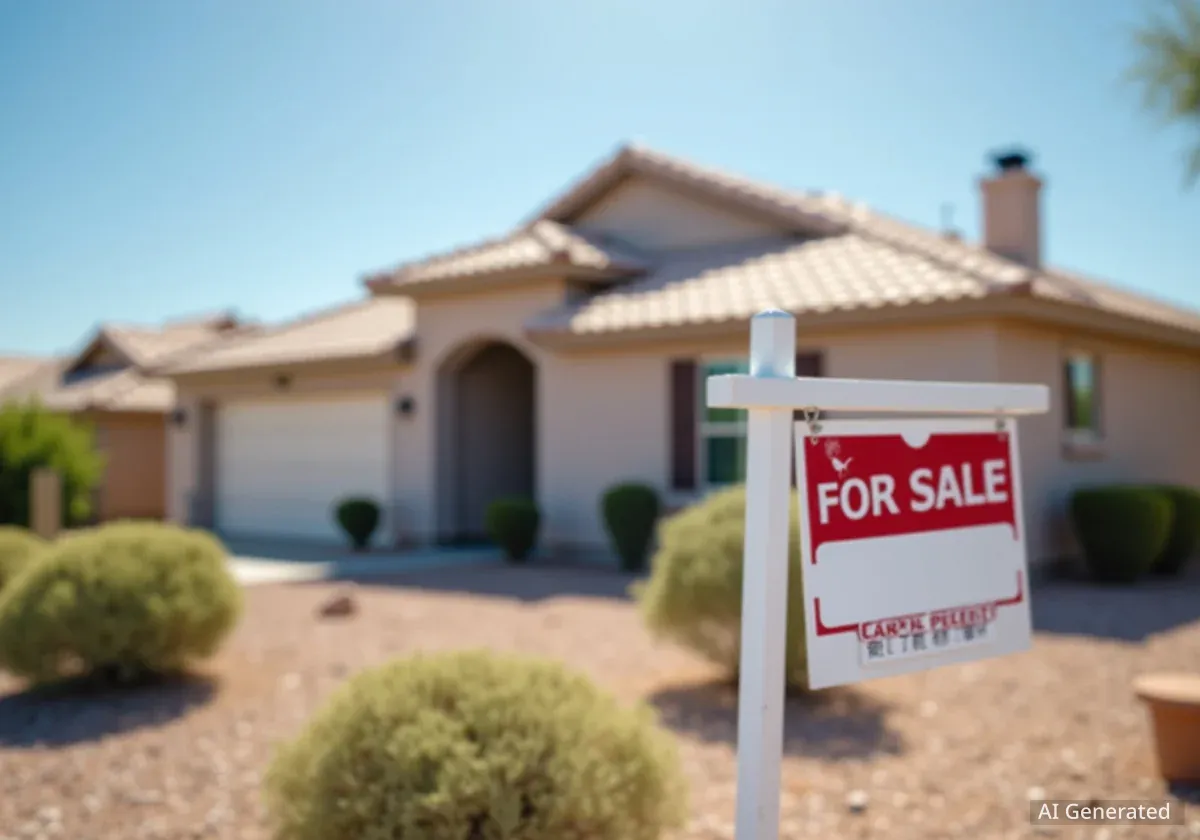A growing number of home sellers in the metro Phoenix area are pulling their properties off the market. This trend comes as sellers grow increasingly frustrated with aggressive buyer demands for lower prices, significant repairs, and financial concessions in a shifting real estate landscape.
Key Takeaways
- Home sellers in Phoenix are canceling listings at an increasing rate due to difficult negotiations with buyers.
- Buyers are reportedly demanding price reductions, funds for major remodels, and interest-rate buydowns.
- One local real estate professional reports that 35% to 40% of his sellers have opted to delist their homes rather than accept current buyer offers.
- This standoff reflects a broader power shift in the housing market, moving from a seller-dominated environment to one with more buyer leverage.
A Power Shift in the Phoenix Housing Market
The residential real estate market in metro Phoenix is experiencing a significant change in dynamics. For the past several years, sellers held a distinct advantage, often receiving multiple offers above the asking price. However, the market has cooled, giving buyers more leverage in negotiations.
This newfound power has led to buyers making substantial demands during the purchasing process. According to local real estate agents, these requests are often more than sellers are willing to accommodate, leading to a stalemate and, ultimately, a canceled listing.
From Seller's Market to Buyer's Advantage
The shift in the market is largely attributed to higher mortgage interest rates, which have reduced buyer purchasing power and cooled demand. This change has forced sellers to adjust their expectations after a period of rapid price appreciation. The current environment allows buyers to be more selective and assertive in their negotiations.
Trevor Halpern, who leads Halpern Residential at eXp Realty, has observed this trend firsthand with his clients. He notes a clear line being drawn by homeowners who are not desperate to sell.
"Some buyers seem to be drunk with power," Halpern stated, describing the current negotiating climate. He explained that many sellers are choosing to wait rather than capitulate to demands they feel are unreasonable.
The Nature of Buyer Demands
The demands from prospective buyers extend beyond simple price negotiations. Sellers are now facing a range of requests that can significantly impact their net proceeds from a sale. These often fall into three main categories.
Common Concessions Requested by Buyers:
- Price Reductions: Buyers are actively seeking to purchase homes for less than the listed price, reflecting the market's slowdown.
- Renovation Credits: Many buyers are requesting sellers to fund expensive remodeling projects, asking for credits to cover updates to kitchens, bathrooms, or flooring.
- Interest-Rate Buydowns: A popular request involves sellers paying to temporarily or permanently lower the buyer's mortgage interest rate, making the loan more affordable.
These concessions can add up to tens of thousands of dollars, eroding the equity sellers had hoped to gain. For homeowners who are not under pressure to move, the financial hit is often not worth the sale, prompting them to cancel the listing and wait for more favorable market conditions.
A Significant Portion of Sellers are Walking Away
According to Trevor Halpern, the number of sellers pulling their listings is substantial. He estimates that 35% to 40% of his seller clients have decided to take their homes off the market if they cannot achieve their desired price and terms. This statistic highlights a significant level of seller resistance to the current buyer-driven demands.
The Seller's Perspective and Strategy
Many Phoenix homeowners who are now choosing to delist their properties are not in a position where they must sell. They may have been testing the market or hoping to capitalize on the high valuations seen over the past few years. When faced with offers that fall short of their expectations, their strategy shifts from selling to waiting.
This decision is often rooted in a belief that the market may rebound or that they can achieve a better return by holding onto the property. For these sellers, keeping their home is a viable alternative to selling at a discount. They are effectively choosing to ride out the current market softness.
The increase in canceled listings suggests a growing gap between what buyers are willing to pay and what sellers are willing to accept. This gap is a classic sign of a market in transition, where price discovery is actively taking place. Sellers who bought or refinanced when interest rates were at historic lows may feel little financial pressure to accept a disappointing offer.
Broader Implications for the Phoenix Real Estate Market
The rise in canceled listings could have several effects on the Phoenix housing market. On one hand, a reduction in available inventory could provide a floor for home prices, preventing a steeper decline. If enough sellers pull their homes, the remaining supply could tighten, creating more competition among buyers for the limited properties available.
On the other hand, the trend also signals seller reluctance to adapt to new market realities. If a large number of properties are simply waiting on the sidelines, it could create a "shadow inventory" that may re-enter the market if conditions improve, potentially limiting future price growth.
For now, the standoff between determined sellers and empowered buyers defines the Phoenix real estate scene. The market's future direction will likely depend on factors such as the path of mortgage rates, local economic performance, and whether sellers' or buyers' expectations adjust first.





